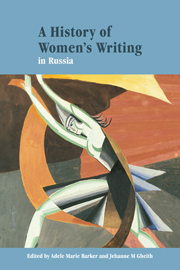Book contents
- Frontmatter
- Contents
- Notes on contributors
- Acknowledgments
- Note on transliteration
- List of abbreviations
- Introduction
- 1 Women's image in Russian medieval literature
- 2 Sappho, Corinna, and Niobe: genres and personae in Russian women's writing, 1760–1820
- 3 The inexperienced muse: Russian women and poetry in the first half of the nineteenth century
- 4 Women of the 1830s and 1850s: alternative periodizations
- 5 “A particle of our soul”: prerevolutionary autobiography by Russian women writers
- 6 The women of Russian Montparnasse (Paris, 1920–1940)
- 7 Women in Russian Symbolism: beyond the algebra of love
- 8 The eastern path of exile: Russian women's writing in China
- 9 Realist prose writers, 1881–1929
- 10 Women and gender in post-symbolist poetry and the Stalin era
- 11 Writing the female body politic (1945–1985)
- 12 In their own words? Soviet women writers and the search for self
- 13 Women's poetry since the sixties
- 14 The persistence of memory: women's prose since the sixties
- 15 Perestroika and post-soviet prose: from dazzle to dispersal
- Bibliographical guide to writers and their works
- Guide to further reading
- Index
12 - In their own words? Soviet women writers and the search for self
Published online by Cambridge University Press: 22 September 2009
- Frontmatter
- Contents
- Notes on contributors
- Acknowledgments
- Note on transliteration
- List of abbreviations
- Introduction
- 1 Women's image in Russian medieval literature
- 2 Sappho, Corinna, and Niobe: genres and personae in Russian women's writing, 1760–1820
- 3 The inexperienced muse: Russian women and poetry in the first half of the nineteenth century
- 4 Women of the 1830s and 1850s: alternative periodizations
- 5 “A particle of our soul”: prerevolutionary autobiography by Russian women writers
- 6 The women of Russian Montparnasse (Paris, 1920–1940)
- 7 Women in Russian Symbolism: beyond the algebra of love
- 8 The eastern path of exile: Russian women's writing in China
- 9 Realist prose writers, 1881–1929
- 10 Women and gender in post-symbolist poetry and the Stalin era
- 11 Writing the female body politic (1945–1985)
- 12 In their own words? Soviet women writers and the search for self
- 13 Women's poetry since the sixties
- 14 The persistence of memory: women's prose since the sixties
- 15 Perestroika and post-soviet prose: from dazzle to dispersal
- Bibliographical guide to writers and their works
- Guide to further reading
- Index
Summary
The problems, dangers, and even the possibility itself of what Voltaire in Candide termed “seeing into the hearts” of historical subjects have become the subject of much historical and literary inquiry in recent years. As scholars engage in dialogue with voices from other eras through the legacy of fiction, memoirs, diaries, and letters, one of the challenges that presents itself is how to decipher the relationship between an author as a free and autonomous producer of a text and his or her “entrapment” within a system where meaning has already been fixed. If literary works are derivative of cultural discourses, they also serve as the venues through which their authors refract and transform the experience of their particular cultural discourse. Thus the historical and cultural “entrapment” of the author within a particular system of signification does not necessarily exclude the possibility of creative self-expression through that same system.
In Soviet Russia during Stalin's time, the possibility of finding room for autonomous expression within an official literary life may seem especially problematic. Indeed, official Soviet literary life held little interest for western critics who preferred to turn their attentions to those writers on the margins of Soviet society who produced narratives of camp resistance, prison survival, and dissident subversion “for the drawer.” The decades-long interest in the latter group on the part of critics in the West is paralleled by a nearly complete silence about the former.
- Type
- Chapter
- Information
- A History of Women's Writing in Russia , pp. 243 - 263Publisher: Cambridge University PressPrint publication year: 2002
- 2
- Cited by



